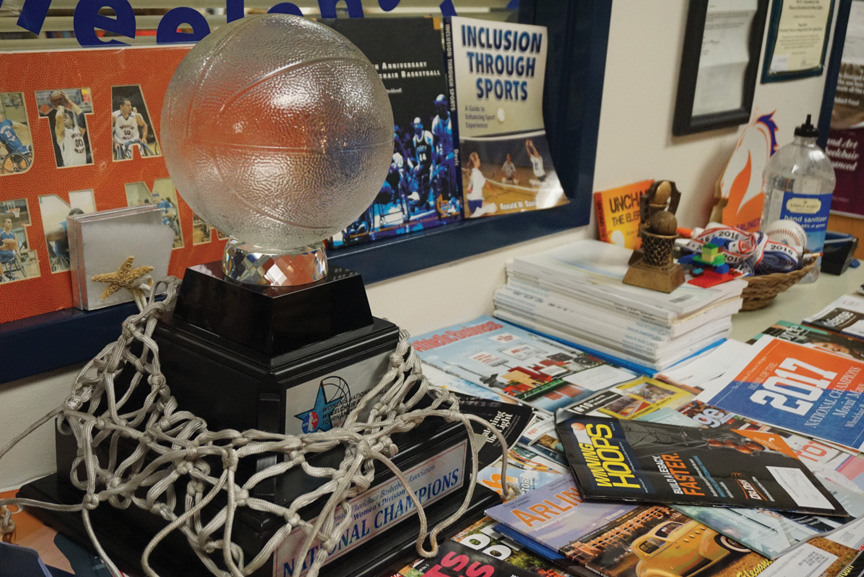
Over the past few years, the city of Arlington has hosted two World Series, a Super Bowl, an NBA All-Star game, a college football national championship and countless other major sporting events. You might say that Arlington has become a “hub” of the sports world, with world-class facilities and three professional teams calling the city home.
Few, however, are familiar with one prominent sports community that has been quietly thriving deep in the heart of the University of Texas at Arlington campus. Doug Garner is the Assistant Director for Adapted Sports and the head coach of UTA’s Movin’ Mavs wheelchair basketball team. In March of this year, the Movin’ Mavs won the National Wheelchair Basketball Association Intercollegiate Championship Tournament, the team’s eighth overall title and first in 11 years.
The Movin’ Mavs team started with humble beginnings in 1976 under head coach Jim Hayes. The program was unable to grant scholarships until the 1989-90 school year.
Garner took over the program after Hayes’s death in 2008 and has seen wheelchair sports grow both in the Arlington community and internationally.
“It’s really an interesting time in the disability sports world,” Garner says. “The awareness of the Special Olympics and the Paralympics is really booming. The NCAA is having more talks in its Equity and Inclusion division about how they can accommodate students with disabilities in sports. The social awareness of people with disabilities is really growing a lot.”
Garner helped start the Lady Movin’ Mavs team in 2013, which won its first NWBA national championship in 2016 under head coach Jason Nelms. Abby Dunkin, a junior on last year’s championship team, was also a member of Team USA in the 2016 Rio Paralympic Games.
This summer, Garner and UTA hosted Dunkin’s U.S. teammates for a week-long camp as Team USA prepared for the America’s Cup tournament, which will be played Aug. 2-12 in Cali, Colombia.
“I think it says a lot for the university to give them the opportunity to come here and train, and compete at that level,” Garner says. “The fact that UTA supports something like this says a lot about the university. It also puts the name of UTA out there around the world. UTA players go on to play international ball, or professional wheelchair basketball in Europe, and that’s how we get a lot of our international players. They find out about the program, they see how well our athletes do, and they want to come train at that level.”
Garner estimates that more than 30 former Movin’ Mavs, men and women, have gone on to represent their national teams.
While many athletes discover UTA through international play, some like Dunkin do so through the military. The sport of wheelchair basketball itself began in Veterans Administration (VA) hospitals where World War II veterans were being treated for various degrees of paralysis. The first game occurred in 1946 in Birmingham, Calif., between a group of veterans and doctors.
“As veterans came home from wars, the NWBA was started as a rehab program,” Garner says. “They come home with different disabilities, and as we helped meet the needs of those veterans, it carried over to the general population of people with spinal cord injuries, or birth defects, or other things that affect people being successful in their environment.”
Dunkin, who developed a nerve disorder called Complex Regional Pain Syndrome at the age of 13, visited Fort Sam Houston in San Antonio at 17 to watch their wheelchair basketball team. She was invited to play with the Fort Sam Houston team on the spot. It was the first time she played the sport, and in 2014 Dunkin committed to play with the Lady Movin’ Mavs and study at UTA.
“Lately, more and more people are hearing about our program,” Garner says. “And they are understanding the value of our program for all people with disabilities. They see that we are able to help people with disabilities use sports as a vehicle to get an education, and to get jobs.”
Those who have come through the program have experienced success after graduation, as well. One example of that is PER4MAX Wheelchairs, started by Movin’ Mav alum Willie Hernandez. The company builds new and innovative products for people with disabilities.
Many UTA players use PER4MAX wheelchairs in competition, and the company partners with the NWBA to provide wheelchairs to its athletes.
It is easy to see that the Movin’ Mavs provide a solid foundation of training and motivation for the players that pass through the program. For Garner, that is the driving force of the program that he runs. “To me, I think anything we can do to provide opportunities to people with disabilities to get a college degree, and to be independent, and to be financially successful, that’s what we need to do,” he says.
And the trophies that come along with it?
“Championships are great, and they are definitely a goal of the program,” he says. “But helping people with disabilities get degrees and go on and be successful in a society that presents a lot of roadblocks, I think that is the biggest part.”

















